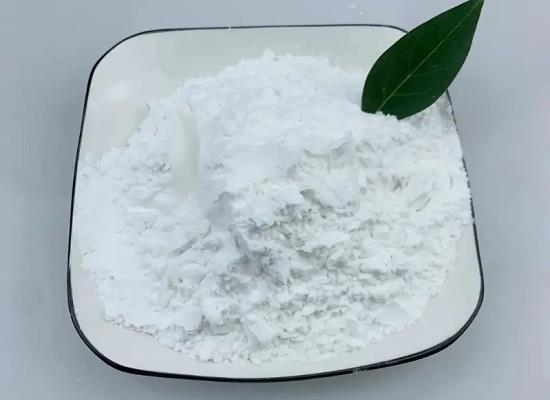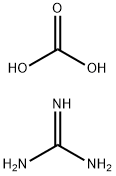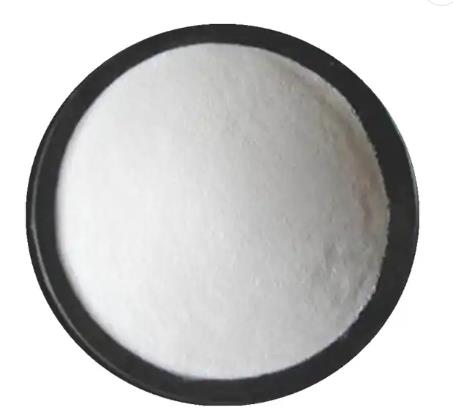Exploring the Uses and Safety Considerations of Guanidine Carbonate
General Description
Guanidine carbonate is a versatile compound with various applications in multiple industries. It possesses distinct properties such as high melting point, good solubility in water, and strong organic alkali properties. It finds use in the production of plastics, resins, rubber chemicals, fungicides, and disinfectants. In pharmaceuticals, it stabilizes cytidine triphosphate injections and acts as a protein denaturant. It is also employed as a pH adjusting agent, grout agent, cement additive, and surfactant. However, guanidine carbonate requires careful handling due to its potential health hazards, including skin and eye irritation, respiratory irritation, and harm to aquatic life. Safety precautions must be taken during storage, handling, and disposal. Overall, guanidine carbonate offers valuable applications but requires cautious usage.

Figure 1. Guanidine carbonate
Properties
Guanidine carbonate is a crystalline powder that is white to almost white in color. It possesses several distinct properties. Firstly, it has a high melting point, exceeding 300°C. Its density is measured at 1.25, indicating its relatively high mass per unit volume. At 25°C, guanidine carbonate exhibits a vapor pressure of 0Pa, meaning it has negligible volatility. The compound demonstrates good solubility in water, with a solubility of 450g/l, while it is only slightly soluble in methanol. On the other hand, it is almost insoluble in acetone, benzene, and ether. With a pka value of 12.5 at 20°C, guanidine carbonate acts as a strong base, readily reacting with both organic and inorganic compounds. Its unique chemical structure, containing imine and aminoacetal functional groups, contributes to its ability to enhance physical properties. Guanidine derivatives, such as guanidine carbonate, are widely used in various industries for the production of plastics, resins, rubber chemicals, photochemicals, fungicides, and disinfectants. This is due to their structure, which includes nitrogen atoms and N=C solid bonds. Additionally, guanidine carbonate can serve as an oxygen scavenger to prevent corrosion damage. Overall, guanidine carbonate offers versatile properties and finds extensive application across multiple industrial sectors. 1
Uses
Guanidine carbonate has various applications due to its strong organic alkali properties. It is commonly used to adjust the pH of formulations, making it useful in the production of organic intermediates, soaps, and cosmetic products. In the field of pharmaceuticals, guanidine carbonate is utilized in the stabilization of cytidine triphosphate injections. Additionally, it acts as a potent protein denaturant, finding applications in protein research and related fields. Furthermore, guanidine carbonate serves as an important chemical intermediate in organic synthesis and analytical reagents. It is employed as a pH adjusting agent for amino resins, antioxidants, resin stabilizers, and guanidine soaps. It is also utilized as a grout agent, cement additive, and surfactant. In the context of synthetic detergents, guanidine carbonate functions as a moisture agent and synergist, enhancing the performance of these products. Guanidine carbonate can be employed as a precipitating agent for the measurement of zinc, cadmium, and manganese weights. It also plays a role in the separation of alkali metals and magnesium. Moreover, guanidine carbonate salt can be used as a reactant in the synthesis of guanidinium dinitramide (GDN), which is an oxidizer. It can also be utilized to produce guanidinium cyclopropanecarboxylate by reacting with cyclopropanecarboxylic acid. Overall, guanidine carbonate demonstrates its versatility and significance across various industries and applications, making it a valuable compound in chemical and pharmaceutical sectors. 2
Safety Considerations
Guanidine carbonate is a chemical compound that requires careful handling due to its potential health hazards. It is classified as harmful if swallowed, and can cause skin and eye irritation upon contact. In particular, it can lead to serious eye damage, making it imperative to avoid direct contact with the eyes. Guanidine carbonate may also cause respiratory irritation, highlighting the need for appropriate ventilation when working with this substance. Moreover, it is harmful to aquatic life with long-lasting effects, emphasizing the importance of proper disposal and avoiding its release into the environment. In terms of specific effects on human health, guanidine carbonate is considered a moderate eye irritant and a skin and strong eye irritant. Ingesting this compound can also lead to harmful effects. To ensure safety when working with guanidine carbonate, it is crucial to wear protective equipment such as gloves, goggles, and respirators. Proper storage and handling are also essential, including following appropriate labeling, keeping the compound away from incompatible materials, and avoiding exposure to heat or flames. Overall, while guanidine carbonate provides valuable applications in various industries, its potential health and environmental hazards require careful attention and precautions to ensure safe handling and usage. 3
Reference
1. Guanidine, carbonate. National Center for Biotechnology Information (2024). PubChem Compound Summary for CID 11650.
2. Carbonic acid, compd. with guanidine (1:2). Consumer Product Information Database, 593-85-1.
3. Diguanidinium carbonate. European Chemicals Agency, EC / List no. 209-813-7.
Related articles And Qustion
Lastest Price from Guanidine carbonate manufacturers

US $5.00-0.50/KG2025-05-13
- CAS:
- 593-85-1
- Min. Order:
- 0.10000000149011612KG
- Purity:
- 99% hplc
- Supply Ability:
- 5000kg

US $0.00-0.00/Kg/Drum2025-04-21
- CAS:
- 593-85-1
- Min. Order:
- 1KG
- Purity:
- 99.0%min
- Supply Ability:
- 10 TONS



